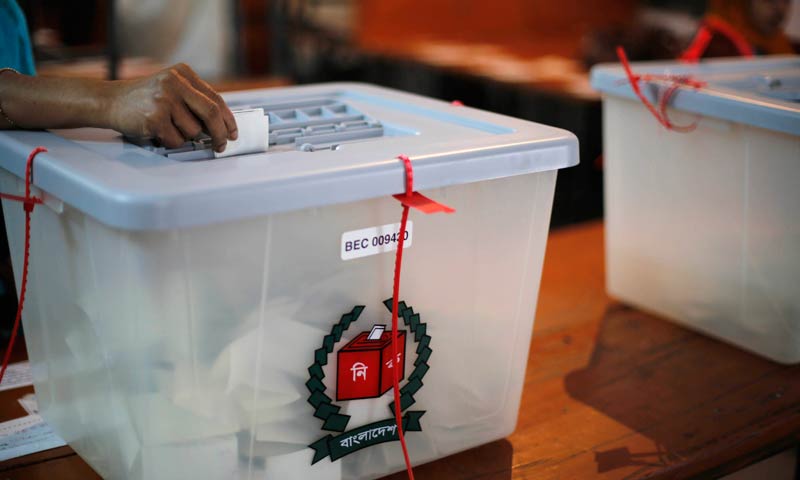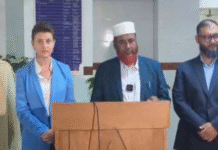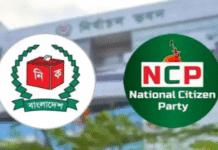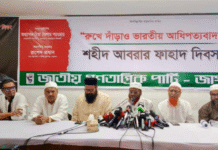Postscript of a sham election
by M Adil Khan
LIKE the movie, Dead man walking, which depicts the story of a convicted murderer in a prison, who first denied but later admitted the crime, awaiting execution, the soon-to-be-installed ‘re-elected’ government of the Awami League (the Asian Human Rights Commission has termed the election ‘fake’) would be a government on a death row that would take few strides before it meets its penultimate fate — death!
Indeed, as this election has already been rejected by the international community (except, of course, India that has instead supported it) as well as by the United Nations and asked for fresh and inclusive election, the soon-to-be re-elected government of the Awami League may already have died, all it needs now is a decent burial.
Sadly, the election 2014 has been both a comedy and a tragedy at the same time. A foreign media reports: ‘The tragedy is, an election that the ruling Awami League itself has termed as one to maintain the formality has cost the nation enormously in terms of money, materials and human lives. Thanks to the bullheadedness of the ruling leadership, and an overzealous Election Commission at its beck and call, the farce could not be avoided.’
Many now wonder how it is that Sheikh Hasina, a seasoned politician who no doubt would have known the consequences of winning a sham election such as this, went for it so stubbornly. Has this been done, as the Awami League claims, to fulfil simply the ‘constitutional requirement’ or is it because, given her government’s dismal record, especially on human rights, a fear of defeat in a free and fair election left her with no choice but to go for it?
Some also argue that the prime minister had little or no control over the process that, according to some, has been dominated by a hegemonic India and its local cohorts that basically dictated the terms and direction of the election process such that it ensured return of an obliging Awami League to the government to guarantee undeterred flow of numerous concessions that it had received from, and extracted of, the country ever since the party came to power, some say also, with the backing of India, in 2008.
Indeed, India’s blatant bias in Bangladesh’s election has been aptly demonstrated through several of its recent acts (both overt and covert) including the pre-election sermon that its foreign minister Salman Khurshid arrogantly gave to the unconvinced international community that, as Bangladesh’s neighbour, ‘it knows best.’
India’s strategic needs are well-recognised and most Bangladeshis are also aware of the role they can play in meeting some of these needs but they expect equality and mutual compatibility in sharing of favours. However, India demands one-sided favour and they found that in exchange of guarantee of security of tenure in government, the Awami League is willing to play the game and provide India with one-sided concessions. India’s addiction to the Awami League stems from this.
Regardless, one still wonders how it is that India, which has one of the finest and most credible and inclusive election governance system, could be so blind as to support an election process in a neighbouring country that was, right from the word go, an utter farce. India’s unprincipled support to this cock-up of an election has shocked and angered many, both within and outside Bangladesh with the result that if the Awami League forms government it will not be able to deliver on its promises.
So, what prompted India to go for such a short-sighted option? Is it suffering from vision deficits or has its policymakers lost control on the policymaking processes, especially those that concern foreign relations?
Tariq Ali, the British-Pakistani social activist, narrates an interesting conversation that he once had with the Indian Prime minister, late Indira Gandhi, in the mid-1970s in the aftermath of the breakup of Pakistan and the creation of Bangladesh. Tariq Ali told Indira Gandhi that Pakistan’s miseries stemmed from the fact that its policies were mainly made by the army generals who were reckless and lacked vision and foresight. Mrs Gandhi responded by saying that India’s generals are not necessarily any better nor are they wiser.
She recalled an incident that during the 1971 war when Pakistan had already lost its eastern wing and its western wing was also under threat from the Indians, General Manekshaw, the Indian army chief came over to Mrs Gandhi and announced, ‘Madam, if you give permission, we can defeat Pakistan army in the western wing as well and conquer Pakistan.’ Mrs Gandhi asked the general to come back after 24 hours. She held an emergency cabinet meeting and discussed Manekshaw’s proposal with her colleagues. Indian cabinet decided against it. Reflecting on this incident Mrs Gandhi told Tariq Ali, ‘You see, when it comes to audacious ideas our generals are not that much different from those of yours, the only difference is this that in India generals do not decide, in Pakistan they do.’
One wonders whether this decision-making equation has changed in India since. It is possible that these days India’s emergence as a regional power and, with this, its hegemonic intents may have allowed its non-elected chauvinistic entities such as the military, the intelligence apparatus, overzealous bureaucrats, etc a much greater space in policymaking, especially in foreign affairs, than what they deserve. If this is the case, it, indeed, is a bad omen, not only for its neighbours but, more importantly, for India itself.
Instructively, the 2014 Bangladesh election may also have revealed another major lesson that surpasses boundaries of the subcontinent and points at a trend of a global nature. With the rise of several regional powers and their hegemonic intents, the world is now mired in multiple forms of geopolitics that seek unequal alliances. At the same time, we also live in a world that is dominated by the neoliberal economic system that also seeks partnerships that are inherently exploitative and extractive in nature. It is these combined compulsions of geopolitics and neoliberal economic arrangements that push for partnerships that are self-seeking and conceding at one end and colonising and pillaging at the other.
In one form or the other, this is the scenario that is being played out from Egypt to Cambodia. Bangladesh is part of this axis of evil — today, the nexus comprises Awami League/India/multinationals/local profiteers; tomorrow, it would be BNP/?/multinationals/local profiteers, etc.
Only collective civic action backed by spirits of true patriotism and strong democratic institutions can save the country from the scourges of these colonising assaults. Indeed, the task ahead is hard and fraught with many dangers but as Nelson Mandela reminds us, ‘When people are determined they can overcome anything!’
M Adil Khan is a former senior UN staff.











The author has touched base on all possible scenarios under which the election-like drama was staged by Hasina. The author, apparently, put more blame on India, to which I have a question! Why would India not look for its own interests? I would put all the blame on the ‘munafiq’ Hasina who outwardly talks of independent Bangladesh, but in essence wants to erase the borders between Bangladesh and India. I would point to the last sentence in this article, i.e. “when people are determined, they can overcome anything!” Let us re-liberate our motherland – once and for all!
Dear Adil Bhai,
Our news Columnists have given up unfavorable analysis against the re-elected Government, who with their allied group won 153 seats without any contest and the 8 seats remaining for re-poll and 14 wins by independents, the balance seats are won by Awami League and its allies. Jatiyo party with 33 seats is poised to play the opposition role in the house. Polls attendance by people have contradicting reports some placing it below 20 % and Election Commission as 40%. Low attendance may have many reasons such as people’s apathy for the poll, resistance by opposition BNP and Jamaat, the former boycotting the poll and the latter being debarred from participation. It is widely rumored that ruling party cadres have indulged in forged voting under silent consent or direct participation of the polling officials. Polls have been conducted in an environment of threat and most people refrained from going out of home. International community is split about the legitimacy of the poll with India and Russia accepting and the rest of the nations and union of nations not accepting the legitimacy.
Most democracies in the world are leaning towards a trend of favoring parties with power of money, media, muscle power, manipulation and maneuverability. In 3rd world countries and specially in Muslim countries people have been turned into pawns in a chess game of polls.
An understanding of this reality, made Sheikh Hasina use all the tricks of the game and win as a better player.
She is prudent enough to realize what is lying ahead as well. All media and media columnists have bowed down and for the rest to do the same is a matter of time and extent of benefit to be gained. The hues and cries of the international community will die down with many other issues growing everyday all over the world that will take over the issues of Bangladesh.
It cannot be predicted at this moment how long this Government will last 2 years or 20 years?
What is required to match Hasina’s cunning is strong pro democratic grass root organisations and not sit in chamber urban based political parties. Mr Kejriwal’s Aam Aadmi Party (AAP) is now posing as a threat for Congress and BJP who emerged as a winner by voicing against corruption alone.
Bangladesh has many issues and prominent of them is Autocracy and fascism ( Out-beating Nazi-Hitler), rampant corruption, gross violation of human rights, Politicization of administration, judiciary and all institution and specially election commission. So far all political parties in Bangladesh are aiming at reaching the same place where from they can perpetuate it for their benefit. Amarty Sen’s view of Development and freedom remains to be attained in many countries.
Our regret is that what we gained at the cost of the blood of 3 million martyrs in 1971 we have lost it in 1914 at the cost of bloods of many people. Loosing democratic right is the same as loosing freedom. I am afraid that the posts that hold my claim of my sovereignty may also lean away to where our leaders want us to align to.
Best Regards